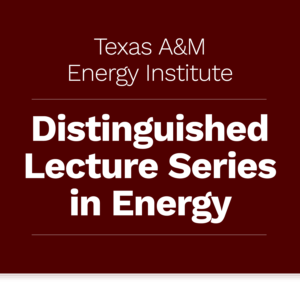
Energy Production and Engineering Biology
& What Metabolic Engineering/Synthetic Biology Can or Cannot Do
The Texas A&M Energy Institute’s Distinguished Lecture Series in Energy will feature Dr. Eleftherios (Terry) Papoutsakis, the Unidel Eugene DuPont Professor at the Department of Chemical & Biomolecular Engineering at the University of Delaware, as well as a Fellow of the Hagler Institute for Advanced Study at Texas A&M University, on Wednesday, August 13, 2025, from 11:00 a.m. – 12:00 p.m. CDT (UTC -5:00) in the Frederick E. Giesecke Engineering Research Building (GERB) Third Floor Conference Room and through a Zoom Meeting. The topic will be “Energy Production and Engineering Biology & What Metabolic Engineering/Synthetic Biology Can or Cannot Do.”
Abstract
Over the last 50 some years, starting in the mid-1970s, it was anticipated that biology would enable technologies to produce energy molecules and other chemicals towards a sustainable manufacturing landscape. There were two waves of efforts, the most recent one starting around 2005 with the establishment of the DOE Bioenergy Centers. Biological production of ethanol, largely as an additive to hydrocarbon fuels, was already firmly established. Ethanol production is cost-effective in countries like Brazil and some South Asia countries based on sugarcane substrates, but it remains less effective and requires subsidies in most other countries. While other higher alcohol (notably butanol) processes have been further investigated, because of their low effectiveness, they remain of little practical interest in the US and the Western world but are practiced to some extent elsewhere. However, no other fuel molecules have made it to the marketplace, and only a few biologically produced commodity chemicals have succeeded, despite enormous investments in Metabolic Engineering/Synthetic Biology. With multibillion-dollar investments, startup companies came, hyped, and went, yet little remains of lasting practical significance. However, niche areas are evolving, mainly in the valorisation of waste gases. I will discuss the current state of practical applications, aiming to separate hype from reality.
Biography
Eleftherios (Terry) Papoutsakis is the Unidel Eugene DuPont Professor at the Department of Chemical & Biomolecular Engineering at the University of Delaware. Papoutsakis has made important contributions in both microbial and animal-cell biotechnology. Microbial biotechnology work includes contributions in clostridia genetics and metabolic engineering with emphasis recently in syntrophic co-cultures for CO2 co-utilization with carbohydrates to achieve supra-physiological product yields. Animal-cell biotechnology includes seminal work on mixing and agitation in cell-culture bioreactors, and stem-cell bioengineering and the use of extracellular vesicles for applications in cell and gene therapies.
He was elected to National Academy of Engineering (NAE), the American Academy of Microbiology (AAM), the National Academy of Inventors (NAI) & the International Academy of Medical & Biological Engineering (IAMBE), and Fellow of ACS, AIChE, AAAS, and AIMBE. He has received numerous awards, including the 2022 William Walker Award (the senior award of the Amer. Institute of Chemical Engineers, AIChE), the 2020 Amer. Soc. for Microbiology (ASM) National Award in Applied Biotechnology, the 2017 Amer. Chemical Society (ACS) E. V. Murphree Award in Industrial & Engineering Chemistry, the 2013 DIC Wang for Excellence in Biochemical Engineering (SBE/AIChE), the 2012 James E. Bailey Award (SBE/AIChE), the 2010 Metabolic Engineering Award, the 2005 Amgen Biochemical Engineering Award, the 2004 Merck Cell Culture Engineering Award & the 2003 Alpha Chi Sigma AIChE Award. He received his BS from the National Technical University of Athens & his MS/PhD from Purdue University. He has supervised in research over 75 PhD, 30 MS, 35 postdoctoral and 85 undergraduate students, funded by over $60 million in grants from NSF, NIH, DOE, ARPA-E, ONR & ARO.
